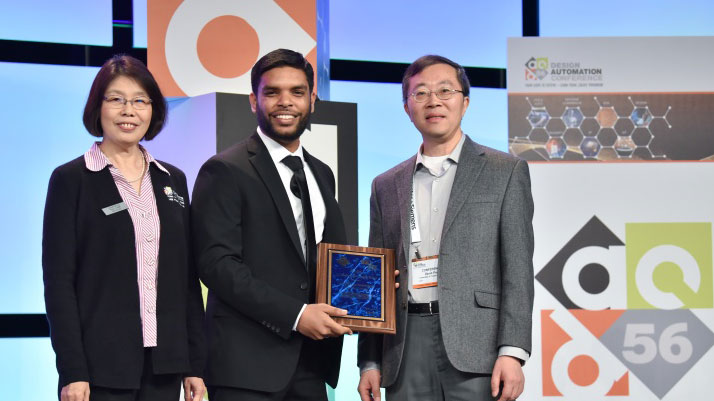
The Association for Computing Machinery's Special Interest Group on Design Automation (SIGDA) has recognized Dr. Jeyavijayan "JV" Rajendran, assistant professor in the Department of Electrical and Computer Engineering at Texas A&M University, with the SIGDA Outstanding New Faculty Award. This prestigious accolade honors a faculty member who is early in their career and demonstrates outstanding potential as an educator and/or researcher in the field of electronic design automation.
“I’d like to thank Texas A&M for providing me the right set of resources and mentors, and also the students and my fellow faculty. My students have been amazing. They push me and challenge me. They give me the bandwidth and motivation to explore more,” said Rajendran. “I’m grateful for them and for the invaluable mentorship I’ve received from my fellow faculty members.”
When considering how to keep digital information safe, many people think about cybersecurity, hacking or various malware programs that protect the software of a computer. However, it is just as critical for the hardware – computer chips, integrated circuits, etc. – to be secure.
“Hardware has become the weakest link in the security system of computers. And, while there are a lot of good techniques that exist for software security, attackers will always target the weakest link. For better or worse, hardware has become that,” said Rajendran.
This is largely due to the globalization of manufacturing materials. With technology advancing and the increasing reliance on computers for everyday life, companies often outsource the creation and testing of computer hardware components to various countries across the world. While this allows businesses to cut costs and keep up with product demands, it also opens the doors to security risks stemming from untrustworthy foundries, test facilities and users. Whether a culprit pirates a design, reverse engineers an integrated circuit to gain access to a computer system, inserts trojans into the hardware or simply recycles a used information system into the construction of a new computer, hardware has become a predominant security risk.

To combat this, Rajendran and a team of researchers have created a provably-secure logic locking technique – the first of its kind – that can prevent attacks from untrusted manufacturers and distributers. Like a key to a safe, logic locking provides a means to protect the original design of a circuit and keep it from being tampered with by outside forces, including piracy, counterfeiting, hardware trojans, reverse engineering and overbuilding attacks.
While logic locking has been used for many years, in many ways, to fortify hardware, the team was the first to create a method that shows the quantifiable and provable resilience trade-off between all known and anticipated attacks. Learn more about their findings in “Provably-Secure Logic Locking: From Theory to Practice.”
His work and algorithmic studies have additionally led to the fabrication of the world’s inaugural piracy-resilient processor design, in partnership with Global Foundries, in a project that stands to impact labs, companies and government agencies alike.
However, along with making a mark on industry, Rajendran is dedicated to supporting his students. Along with integrating interactive discussions and projects into his coursework, he has provided mentorship to both graduate and undergraduate researchers. He has acted as a guide in projects, presenting research opportunities as fun and exciting, rather than intimidating and tedious.
This devotion to enhancing education prompted Rajendran to co-found Hack@DAC, a global student hardware security competition that bridges the gap between industry, government agencies and academia by challenging student teams to solve real-world electronic design automation problems. Held for the first time in 2017, Hack@DAC attracted 50 researchers. In 2018, that number grew to 54 student teams, worldwide. Through this, several security vulnerabilities were found in open-source processer designs, which were then relayed to designers so that they could be fixed.
“Young faculty members are always pushing themselves to stand out. Am I solving the right problems? Am I solving them correctly? How can I do better?” said Rajendran. “Accolades like the SIGDA Outstanding New Faculty Award show that the community values young faculty and their contributions. It’s a confidence boost to keep going.”
A branch of the Association for Computing Machinery, SIGDA strives to advance the knowledge and skills of electronic design automation around the globe. Through grants, recognitions and conferences, SIGDA connects expert professionals and students in order to expand and enhance the research and application of electronic design automation technologies.